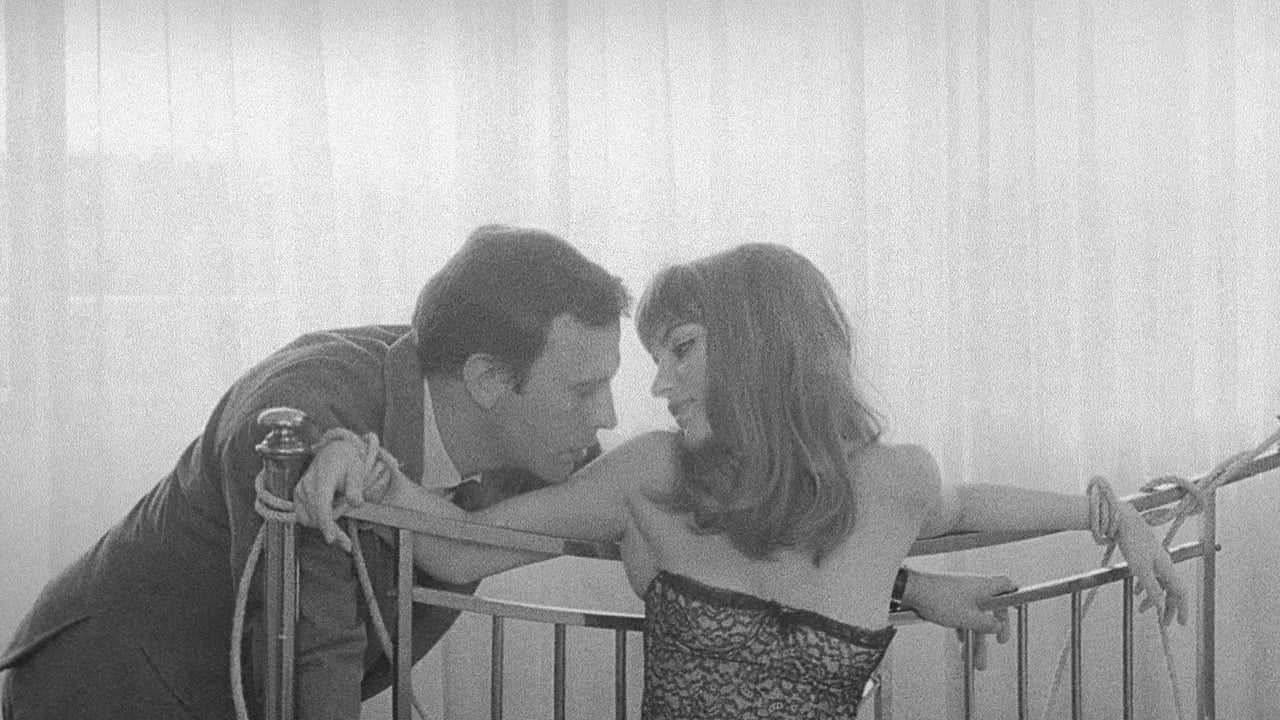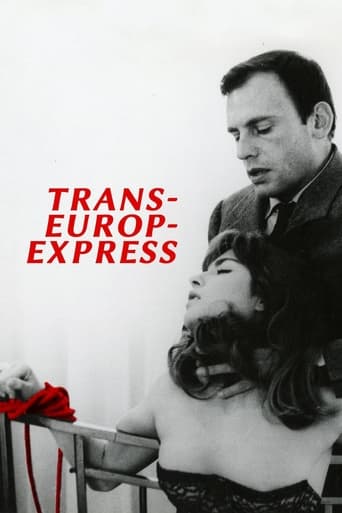

Highly Overrated But Still Good
... View MoreExcellent, smart action film.
... View MoreDid you people see the same film I saw?
... View Morean ambitious but ultimately ineffective debut endeavor.
... View MoreAlain Robbe-Grillet's Trans-Europ-Express (1967) is a film about making a film. As such, it is thematically related to Ingmar Bergman's Persona (1966),and Vilgot Sjoman's I Am Curious (Yellow)(1967) and I Am Curious (Blue)(1968). That these European films were made almost simultaneously seems more than a mere coincidence here, and suggests some cross fertilization of filmmaking ideas.In any case, all these films center upon the same theme: "Where does the movie end, and reality begin?" The idea, of course, is hardly new, for in 1599, it was Shakespeare who penned in his play As You Like It: "All the world's a stage, And all the men and women merely players." The point is that stage plays and theatrical films are merely a refinement and an objectification of what everyday people do everyday. We all assume the roles that society assigns to us, and read the lines off the script appropriate to a specific role, all the while wearing the "theater mask" for that socially assigned role.But it is Bergman, in his Persona, who most clearly articulates the main issue here, that while we are wearing various social masks, assuming our various social selfs, we are, to some extent, cutting ourselves off from our true, inner self. This is where the "inauthenticity", the emptiness, and the lack of real meaning in life that the Existentialists love to talk about emanates.This is significant to the character of the protagonist Elias in Trans-Europ-Express, because he comes across as a man without a real self, a genuine self. In fact, the viewer never learns the protagonist's real name for Elias is an alias, thusly making our protagonist somewhat anonymous, somewhat lacking in a real self in the storyline itself. Add to that the fact that his "mission" in the film as a drug courier is a role that was recently assigned to him, a role then that his is just "rehearsing", and thus distant from his real self, and we have a perfect model of a seemingly "everyday man" who has donned a social mask and is merely playing a contrived social role . Elias' proclivity toward prostitutes and sado-masochism is particularly interesting in this regard too, because his brutal sado-masochistic persona, which emerges when he is alone with a prostitute seems alien to his personality in all other scenes in the film. So, the sado-masochistic Elias is prominently portrayed as an assumed social role, an assumed social mask as well, somehow divorced from his real, genuine,inner self.In short, Elias as a role in a contrived screenplay, is little more "real" than the actual Elias portrayed in the "reality" of the drug smuggling operation itself. Elias, as both portrayed in the film as a figment of a screenwriter's imagination, as a "real" person, using an alias, in a drug smuggling scheme, are equally unreal, equally "inauthentic", as the Existentialists like to say.As such, the character Elias is somewhat reminiscent of the Beatles song "Nowhere Man" which was, coincidentally or not, released in 1966. All the way around, Elias, in this film, is a "Nowhere Man", just as we all are, to a certain extent, as we offer ourselves as the willing pawns of the social institutions, and the social influences all around us in our everyday lives.
... View MoreThe films of Alain Robbe-Grillet may be clever, intellectually stimulating and effective but they can also be over serious and difficult to watch. This one is almost a complete joy. Beautifully photographed in wonderfully crisp b/w it looks great throughout. The director and his wife appear as passengers on the famous train, travelling to Antwerp and decide to conjure up a spy story. The superb, Jean-Louis Trintignant is the main man here and would appear to be the puppet for their story. Certainly we see him carrying out the actions they dictate into their tape recording machine as he goes hither and thither around the great city, of which we see much. Indeed, Antwerp being a favourite city of mine is another reason for this being so pleasurable for me to watch. The biggest surprise for me here, was not the much heralded, though undeniably effective S&M sequences but the extent to which humour plays a part here. There is a Bond poster on the wall at one point, as well as a shot from a Goddard film and it would seem Mr Grillet is also having a bit of a go at the very genre itself. Marvellous.
... View MoreOn board the TEE is 'Elias' (Jean-Louis Trintignant), a paranoid drug dealer on his way from Paris to Antwerp. And in another compartment are his creators; film-makers having a script meeting from which Elias emerges. It's a typical Robbe-Grillet construct, honed from nouveau roman experiments. The purpose of which, as he puts it, is to "assist change by throwing out any techniques which try to impose order or a particular interpretation on events". The result in this case is a parallel universe, on one hand Elias trying to act like a drug dealer and on the other, proceeding according to the whims of his creators. In effect, it becomes a real-time replay of the writing and editing process,There are those who might regard this as typical French pretension, full of intellectual conceit (it was banned in England for many years), but it's playful, witty and very accessible thanks to a droll script and the great Jean-Louis. And then there's the beautiful Marie-France Pisier with her large inquisitive eyes. She makes an unlikely hooker, but is she? The scriptwriter on the train is played by Robbe-Grillet himself and so establishing that he really is making it up as he goes along. It's beautifully shot in crisp b&w, perfectly capturing the zeitgeist. It would be another twelve years before Kraftwerk created their musical homage to the great train, but it says something about both forms that it would have made the perfect soundtrack.
... View MoreGiven that TRANS-EUROP-EXPRESS is the only movie directed by Alain Robbe-Grillet which the late conservative British film critic Leslie Halliwell reviewed in his celebrated “Film Guide”, one would think that it was more accessible than his usual reportedly impenetrable stuff and, in a way, it is – but still, the end result is hardly straightforward and almost as cerebral! Jean-Louis Trintignant, in the first of four films he made with Robbe-Grillet, plays a novice drug courier tested by his future employers in carrying a stash of cocaine (which is actually sugar) by train and depositing it into a train station locker – but this simple task is fraught with any number of unexpected complications including police interrogation and night-time chases. Marie-France Pisier is a very beguiling presence here as a whore/double agent with whom Trintignant has several S&M encounters in a hotel room until her ‘double face’ drives him to murder…or does it? Although I was aware that the actress had played Colette in Francois Truffaut’s Antoine Doinel series and had the leading role in the trashy THE OTHER SIDE OF MIDNIGHT (1977), looking at her filmography just now I was surprised to learn that she was also in one of my favorite films, Luis Bunuel’s THE PHANTOM OF LIBERTY (1974), as well as Jacques Rivette’s ambitious fantasy CELINE AND JULIE GO BOATING (1974; which I’ve just acquired via the BFI’s 2-Disc edition)! What this film has that the other Robbe-Grillet titles I’ve watched (including THE IMMORTAL ONE [1963]) don’t, is a surprisingly substantial dose of humor: in fact, the writer-director himself appears as a train passenger who is contemplating a film about drug-trafficking which (given that he happens to be on the train himself) would be an ideal vehicle for Jean-Louis Trintignant!; similarly, when Trintignant and Pisier go to a café he tells her that the waiter who had just served them was not a waiter at all but an actor playing a waiter!; during one of the various meetings with his shady employers, Trintignant is asked to repeat where he is supposed to meet his contact – implying a very complicated route – he simply replies “Where” (at which his employer doesn’t even bat an eyelid!), etc. At one point, Robbe-Grillet’s fellow passengers complain that drug-trafficking is no longer hip and that diamond-smuggling is the current criminal fad; therefore, Trintignant & Co. exchange costumes and settings accordingly…before the director decides to stick to his original idea (whim?) after all! Incidentally, this ‘screenplay-in-the-making’ structure reminds one of the contemporaneous Hollywood comedy, Paris WHEN IT SIZZLES (1964), which was itself a remake of an earlier French original – Julien Duvivier’s LA FETE A' HENRIETTE (1952). In fact, the whole self-referential element in the film and its heady spoof on the thriller genre recalls the Jean-Luc Godard of BREATHLESS (1960), BAND OF OUTSIDERS (1964), ALPHAVILLE (1965) and PIERROT LE FOU (1965) more than anything else...Unfortunately, what I said about the poor video quality of EDEN AND AFTER (1970) applies to an even greater extent here – since this one looked distinctly like a tenth-generation dupe (with actors’ features being quite blurred at times and especially, alas, during the S&M striptease act towards the end). That said, the film itself is let down somewhat by sluggish pacing – even if the version I watched ran for a mere 88 minutes, when all sources I know of give its running-time as 105! As it is, I’d welcome a legitimate DVD release of TRANS-EUROP-EXPRESS and one hopes that the recent passing of its creator will inspire adventurous labels to pursue its rights.
... View More